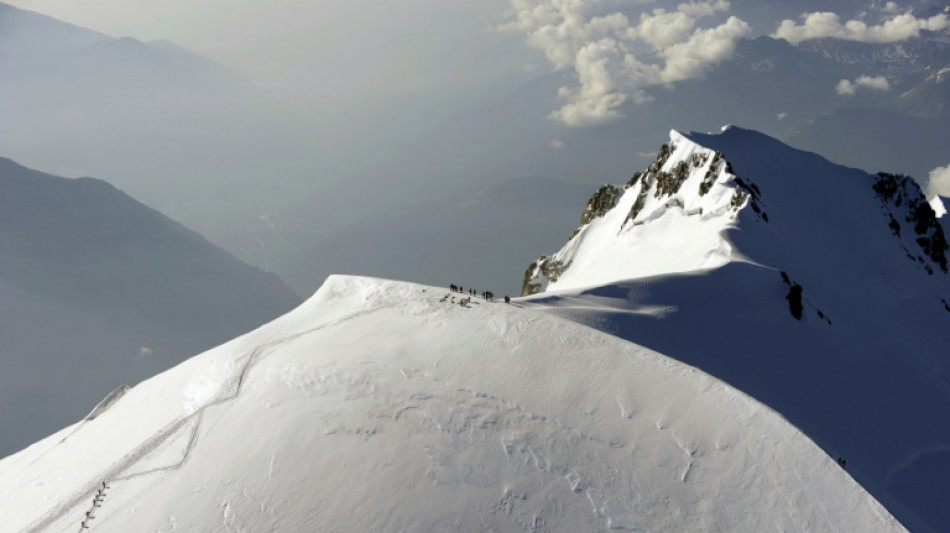Mont Blanc shrinks by over two metres in two years / Photo: PHILIPPE DESMAZES - AFP/File
France's highest mountain, Mont Blanc, has shrunk by over two metres in height over the past two years, researchers said on Thursday, measuring the Alpine peak at 4,805.59 metres (15,766.4 feet).
The 2.22-metre (7.28-foot) decline could be down to lower precipitation during summer, said Jean des Garets, chief geometer in the Haute-Savoie department of southeastern France.
"Mont Blanc could well be much taller in two years" when it is next measured, he added, saying this was not the first time such a large change had been seen.
The mountain's rocky peak measures 4,792 metres above sea level, but its thick covering of ice and snow varies in height from year to year depending on wind and weather.
Researchers have been measuring it every two years since 2001, hoping to garner information about the impact of climate change on the Alps.
"We're gathering the data for future generations. We're not here to interpret them," des Garets said.
People shouldn't use the height measurement "to say any old thing", he urged.
Instead, "it's now up to the climatologists, glaciologists and other scientists to make use of all the data we've collected and come up with theories to explain" the shrinkage.
Mont Blanc's highest recorded summit was in 2007, at 4,810.90 metres.
A one-metre fall was measured in 2021 compared to 2017 -- after 2019's unusually low result was kept secret as experts judged it not representative.
- Vanishing glaciers -
"Mont Blanc's height has been fluctuating since time immemorial," the geometers say.
Within the year, strong winter winds usually scour away more snow than in summer, meaning the peak is higher as autumn begins than in early spring.
"We've learned a lot from these measurement campaigns. We know that the summit is constantly changing in altitude and position, with changes of up to five metres," des Garets said.
Faster melting has been observed in Alpine glaciers as a result of climate change.
European glaciers -- many at lower altitude than elsewhere on the globe -- are especially vulnerable to global warming.
They lost around one-third of their volume between 2000 and 2020, according to scientific data.
In 2022 alone, glaciologists believe up to seven percent of the remaining mass of the glaciers may have vanished.
But one of the Mont Blanc team members, Denis Borel, urged people to "stay humble" about climate's impact on the mountain.
People shouldn't "draw hasty conclusions about measurements that have only been made precisely since 2001", he added.
Around 20 people scaled the mountain in mid-September to carry out the measurements over several days, divided into eight parties equipped with high-tech tools and -- for the first time -- a drone.
L.Panchal--BD
